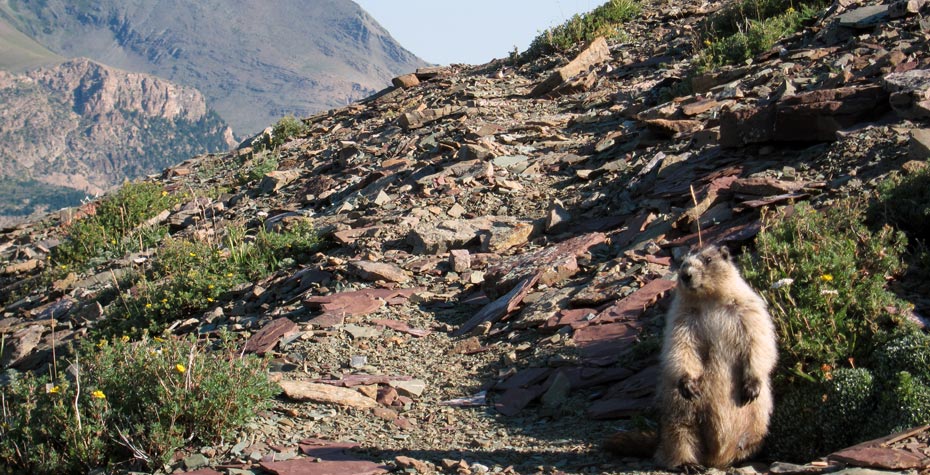Alden Griffith and Two Students Investigated Plants in Glacier National Park

Last month, Assistant Professor of Environmental Studies Alden Griffith and his summer research assistants, Tania Ahmed ’16 and Shivani Kuckreja ’16, spent a week conducting ecological research in the mountains of Montana’s Glacier National Park.
Griffith’s research examines the role of positive interactions (also known as facilitation) among plant species. Negative interactions, such as competition, among neighboring plants have long been studied and during the 20th century, and were thought to be the main driver of observed ecological patterns. More recently, researchers have begun exploring the idea that positive interactions can exist alongside negative ones, with potentially important consequences for ecological communities and biodiversity.
“In particular,” says Griffith, “facilitation has been found to often be more important in stressful environments -- such as mountains, deserts, and salt marshes-- where beating the elements is often more important than beating your neighbor. In these environments the relative importance of competition is less and the benefits provided by neighboring plants, like protecting from wind, buffering temperature extremes, and improving soil quality, can tip the scales toward an overall positive interaction.”
In Glacier National Park, Griffith and his research team sought to examine the influence of neighboring plants on the perennial plant Smelowskia calcyina on a mountain peak in the range. Each morning, the Wellesley team hiked over three miles (and a half-mile up in vertical elevation) to the research site. They established new plots, marked and measured hundreds of individual plants for long term study.
“The novel aspect of the study is that we're taking a demographic approach,” says Griffith, “which will allow us to not only ask questions about individual plants, but about the potential importance of facilitation for the entire population. Could these plants persist at the top of a mountain without the help of others?”
Ahmed and Kuckreja, both sophomores, participated in the research through the Science Center Summer Research Awards. The program offers rising sophomores, juniors, and seniors fully-funded opportunities to partner with professors in cutting-edge research in many disciplines, from biology and chemistry to psychology, computer science and more, for nine or ten weeks over the summer.
“I learned how to do ecology research first-hand,” says Ahmed, whose major is undeclared. “Research takes flexibility and a willingness to learn from mistakes and to try again. The plots from last year had tags on Smelowskia that were worn out and difficult to read. We tried our best to collect data on those plants, but we created new plots in which we used metal tags with engraved numbers, rather than tape tags with Sharpied-on numbers. Together we brainstormed ideas on how to make the data more robust, and we applied them as we went along.”
For Kuckreja, the Glacier Park expedition was “absolutely amazing.” She says, “Although the hikes up the mountain were tedious and tiresome, it felt amazing to finally reach the field sites- the views were breathtaking from where we were collecting data!”
Being surrounded by the glorious landscape definitely had its perks. Highlights included seeing a moose and her baby, bighorn sheep and a black bear, hanging out with a “very curious and social” marmot, riding out a simultaneous hailstorm and thunderstorm while at the campsite, falling asleep with the setting sun, greeting a chipmunk who crawled into the students’ tent, and others. “One night I was able to watch a lightning storm that lit up the sky from behind mountains so far away I could not hear the thunder,” said Ahmed. “At the same time I was able to watch shooting stars in the clear sky overhead.”
“Most of all,” she said, “I learned that spending days measuring plants on a mountain with two other people for a week takes a good sense of humor. Doing research this summer with Alden and Shivani was one of the best experiences I have had.”
